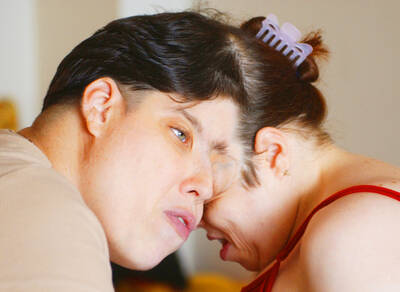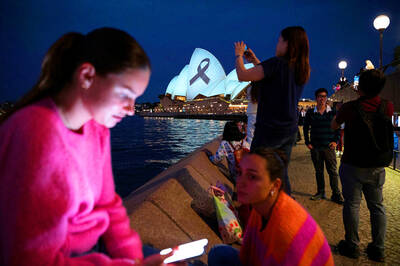Banished from public consciousness for decades, the nightmare of nuclear warfare has surged back to prominence with Russia’s invasion of Ukraine, highlighting the erosion of the Cold War global security architecture.
With Moscow on the back foot in its offensive, the military stalemate has raised fears Russia could resort to its nuclear arsenal to achieve a military breakthrough.
Russia, along with the UK, China, France and the US, are the five recognized nuclear weapons powers and permanent UN Security Council members.
“It’s the first time a nuclear power has used its status to wage a conventional war under the shadow cast by nuclear weapons,” former NATO deputy secretary-general Camille Grand said.
“One might have imagined that rogue states would adopt such an attitude, but suddenly it’s one of the two major nuclear powers, a member of the UN Security Council,” he said, adding that the actual use of the weapons remains “improbable.”
For now, the moral and strategic nuclear “taboo” that emerged after the US bombings of Hiroshima and Nagasaki in Japan at the end of World War II in 1945 still holds, but rhetoric has escalated massively.
Russian TV broadcasts, since the invasion of Ukraine, have repeatedly discussed nuclear strikes on Western cities such as Paris or New York.
One former Russian diplomat, asking not to be named, warned that if Russian President Vladimir Putin felt his nation’s existence was threatened, “he will press the button.”
The year’s events have been a harsh wake-up call for Europe, which spent decades in a state of relative relaxation in terms of nuclear security, enjoying the so-called Cold War “peace dividend.”
Across the Atlantic, US President Joe Biden in October warned of a potential “Armageddon” hanging over the world.
“The most spectacular event of the past half century is one that did not occur,” Nobel-winning economist and strategy expert Thomas Schelling wrote in 2007.
However, the framework that kept world leaders’ fingers off the button after 1945 had been crumbling for years before Putin’s order to invade.
The US in 2002 quit the critical Anti-Ballistic Missile Treaty it had signed with the Soviet Union in 1972, which maintained the nuclear balance of power.
Other important agreements fell away in the years that followed, including the Intermediate-Range Nuclear Forces Treaty that Washington dropped in 2019, blaming Russia for not complying.
“Regarding disarmament, it’s all in ruins, apart from New Start,” Grand said, referring to the agreement with Russia to reduce the numbers of warheads, missiles, bombers and launchers.
India, North Korea and Pakistan, along with the five recognized powers, also have nuclear weapons, while Israel is widely assumed to do so while having never officially acknowledged it.
North Korea sharply stepped up missile testing this year, continuing its pursuit of an independent nuclear deterrent that began when it quit the Non-Proliferation Treaty (NPT) in 2003.
Washington, Seoul and Tokyo all believe a seventh nuclear weapons test by Pyongyang is imminent.
The isolated dictatorship in September announced a new nuclear doctrine, making clear that it would never give up the weapons and that they could be used pre-emptively.
“We’re going to see a very dangerous crisis in Asia,” Chung Min Lee, a researcher at the Carnegie Endowment for International Peace, told a Paris conference.
Non-nuclear countries in the region fear that the protection provided by the US nuclear umbrella is fraying.
“If you imagine extended deterrence as a water balloon, today the water balloon has some critical holes and water is seeping out,” Lee said.
China’s nuclear arsenal is also growing and in the Middle East, the struggle to revive the 2015 nuclear deal with Iran, hobbled by its brutal repression of protests at home, has revived fears that Tehran could soon be a “threshold state” on the brink of building a bomb.
A UN conference in August on the future of the NPT saw a joint declaration by 191 states blocked at the last moment by Russia.
One French diplomat reported “extraordinarily aggressive nuclear rhetoric” from Moscow and “disdain” for the treaty.
“We saw a break in Russia’s attitude, which had historically been in support of the NPT,” the diplomat added.
China was “very vocal,” offering a “very crude denunciation” of the US-UK-Australia alliance that would deliver nuclear-powered submarines to Canberra, the diplomat said.
Beijing claimed that the alliance risked further nuclear proliferation, while failing to “lift doubts about the opacity of its own nuclear doctrine or the speed at which its arsenal is growing.”
The invasion of a state that willingly gave up nuclear weapons, Ukraine, by its nuclear-armed neighbor has increased fears of proliferation.
“Today, countries like Japan or South Korea might legitimately ask whether” they need a bomb of their own, said Jean-Louis Lozier, a former head of France’s nuclear forces. “The same is true in the Middle East of Saudi Arabia, Turkey and Egypt.”

Republican US lawmakers on Friday criticized US President Joe Biden’s administration after sanctioned Chinese telecoms equipment giant Huawei unveiled a laptop this week powered by an Intel artificial intelligence (AI) chip. The US placed Huawei on a trade restriction list in 2019 for contravening Iran sanctions, part of a broader effort to hobble Beijing’s technological advances. Placement on the list means the company’s suppliers have to seek a special, difficult-to-obtain license before shipping to it. One such license, issued by then-US president Donald Trump’s administration, has allowed Intel to ship central processors to Huawei for use in laptops since 2020. China hardliners

Conjoined twins Lori and George Schappell, who pursued separate careers, interests and relationships during lives that defied medical expectations, died this month in Pennsylvania, funeral home officials said. They were 62. The twins, listed by Guinness World Records as the oldest living conjoined twins, died on April 7 at the Hospital of the University of Pennsylvania, obituaries posted by Leibensperger Funeral Homes of Hamburg said. The cause of death was not detailed. “When we were born, the doctors didn’t think we’d make 30, but we proved them wrong,” Lori said in an interview when they turned 50, the Philadelphia Inquirer reported. The

RAMPAGE: A Palestinian man was left dead after dozens of Israeli settlers searching for a missing 14-year-old boy stormed a village in the Israeli-occupied West Bank US President Joe Biden on Friday said he expected Iran to attack Israel “sooner, rather than later” and warned Tehran not to proceed. Asked by reporters about his message to Iran, Biden simply said: “Don’t,” underscoring Washington’s commitment to defend Israel. “We are devoted to the defense of Israel. We will support Israel. We will help defend Israel and Iran will not succeed,” he said. Biden said he would not divulge secure information, but said his expectation was that an attack could come “sooner, rather than later.” Israel braced on Friday for an attack by Iran or its proxies as warnings grew of

A prominent Christian leader has allegedly been stabbed at the altar during a Mass yesterday in southwest Sydney. Bishop Mar Mari Emmanuel was saying Mass at Christ The Good Shepherd Church in Wakeley just after 7pm when a man approached him at the altar and allegedly stabbed toward his head multiple times. A live stream of the Mass shows the congregation swarm forward toward Emmanuel before it was cut off. The church leader gained prominence during the COVID-19 pandemic, amassing a large online following, Officers attached to Fairfield City police area command attended a location on Welcome Street, Wakeley following reports a number